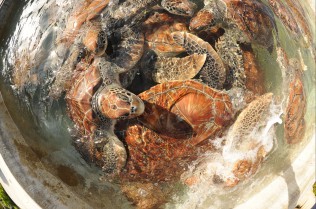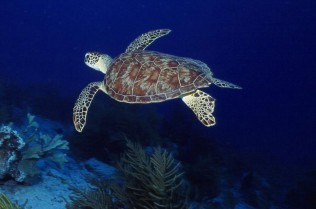The world’s last remaining turtle farm has recently come under heavy criticism from the World Society for the Protection of Animals (WSPA) and the Sea Turtle Conservatory (STC). As part of a global campaign targeting sea turtle farming practices, the WSPA has proposed that the Cayman Turtle Farm (CTF) transition its business from a facility for farming endangered sea turtles for human consumption to a rehabilitation and research center.
CTF is advertised as the Cayman Islands’ largest land-based tourist attraction and an “iconic aspect of the Cayman Islands.” With more than 200,000 visitors each year, the CTF runs a series of educational, cultural and entertainment programs, creating a wildlife experience for visitors to the British Overseas Territory in the Caribbean.
WSPA claims that the CTF is guilty of animal cruelty, and has revealed undercover footage of endangered sea turtles being kept in dirty and cramped conditions. The investigation follows the death of 300 turtles at the CTF in August 2012, reportedly due to a faulty water pipe.
WSPA’s water samples also found traces of salmonella, E. coli and Vibrio vulnificus in the turtle touch tank waters at the CTF. WSPA argues that the presence of these diseases means that it is not safe to reintroduce these bred turtles into the wild, as CTF currently does as part of its conservation program. According to the CTF, an independent examination of the turtle population has been conducted following WSPA’s investigation and found no traces of these diseases.
The WSPA campaign has been supported by celebrities such as Sir Paul McCartney, who tweeted that “There is no humane way to farm sea turtles.” Other conservation organizations, such as SEE Turtles, also support the campaign. More than 100,000 people have signed an online petition since the campaign’s launch in October.
In response to WSPA’s claims, the CTF argues that its “primary focus is on operation as a unique, safe and sustainable tourism attraction supporting the research and conservation of sea turtles.”

“We found no evidence of the kinds of injuries or defects among turtles reared at our facility that the WSPA is listing in its assertions against us,” CTF wrote in a press release in October. “We have instead succeeded in maintaining the health and well-being of our turtle population through established veterinary treatment protocols and methods.”
In a recent press release issued in response to the WSPA’s allegations, the Cayman Islands Department of Tourism stated that the “Cayman Islands does not condone or tolerate cruelty to, or the inhumane or improper treatment of any animal, particularly the sea turtle.”
The Cayman Islands Government also stated that it had not received notification of any complaints or allegations of cruelty at the Farm prior to the recent claims by the WSPA.
An independent audit is currently being conducted with the CTF, with results expected to be released this month. “Notwithstanding the preponderance of evidence to the contrary,” the release stated, “the allegations by the WSPA are being taken seriously.”
STC’s Director of International Policy, Marydele Donnelly, said that the campaign supports evolving the CTF into a “fully educational facility for Caribbean sea turtles and other marine life.”
“In promotional material, the Cayman Turtle Farm “celebrates Caymanians’ stewardship of the seas and relationship with nature’ but in reality the Farm has a history of keeping turtles in unsanitary and crowded conditions and fails to provide meaningful conservation benefits,” Donnelly said.
She added, “For decades the UK Government has stubbornly supported the Farm’s subsidized turtle meat operation, but as a result of the scandal and this campaign, [it] has hired an independent reviewer to evaluate the Farm in the near future. If the reviewer recommends shutting down meat production, the campaign will be a long-awaited success.”
For further information or to support the campaign, please visit www.stopseaturtlefarm.org.
Read Ethical Traveler's Reprint Policy.

